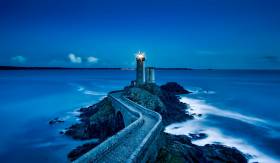Displaying items by tag: Go Atlantic Blue
Famous buildings and landmarks across Ireland will ‘Go Atlantic Blue' over the weekend 7-10 June to celebrate our connection to the Atlantic Ocean as part of World Oceans Day.
The global day this Saturday 8 June connects people worldwide in celebrating the ocean, its importance in our lives and how each of us can protect it, no matter where we live.
In Ireland, more than 20 different landmarks are expected to participate in the day by lighting up their buildings.
Businesses, shops, schools and homes across the country will also ‘Go Atlantic Blue’ on the day also being celebrated by the likes of surfing scientist Easkey Britton, who spoke recently to Independent.ie about her own oceanic connections.
Everyone’s participation will highlight the strong connection that people in Ireland have with the Atlantic Ocean and the multiple ways that it affects and enriches our daily lives.
‘Go Atlantic Blue’ is being spearheaded in Ireland by the Marine Institute-led AORA-CSA (Atlantic Ocean Research Alliance Co-ordination & Support Action) against the backdrop of SeaFest 2019 and the Our Ocean Wealth Summit, both taking place in Cork in the coming days.
SeaFest is Ireland’s national maritime festival and Our Ocean Wealth Summit is Ireland’s flagship event for the marine sector, bringing together Irish and international organisations to create innovative and sustainable solutions to drive our Blue Economy.
This is the first year to ‘Go Atlantic Blue’ with the aim of raising awareness of the vital role that the Atlantic Ocean plays in the lives of Irish people, no matter how near or far they live from the Atlantic coastline.
Among the activities that AORA promotes through its work are the development of an ‘Atlantic community’, made up of citizens of countries that neighbour the Atlantic Ocean, and also exploring, observing and mapping the remainder of the Atlantic Ocean floor (which AORA calls “the last great exploration campaign on Earth”).
“Our ocean is our greatest natural resource and we see that most directly in Ireland with the vital importance that the Atlantic Ocean plays in our daily lives”
Marine Institute chief executive Dr Peter Heffernan said: “Our ocean is our greatest natural resource and we see that most directly in Ireland with the vital importance that the Atlantic Ocean plays in our daily lives — from influencing the weather to facilitating our trade industry and from seafood to surfing off the coast.
“The Marine Institute is proud to support the ‘Go Atlantic Blue’ initiative from 7-10 June, particularly at SeaFest and Our Ocean Wealth Summit, and we encourage and welcome everyone to come onboard.”
Dr Margaret Rae, director of AORA-CSA, said that the initiative gives people all around the country a chance to show their appreciation for the Atlantic Ocean.
“In Ireland, the Atlantic Ocean means so much to us. It’s our largest natural resource and we draw so much from it — our livelihoods, food, bounty, beauty, imagination, inspiration, song, poetry, health and wellbeing and much much more.
“Going Atlantic Blue is a way to draw attention to how each and every one of us experiences the Atlantic, what we love about our ocean and how we can be that generation that makes a difference.”






























































